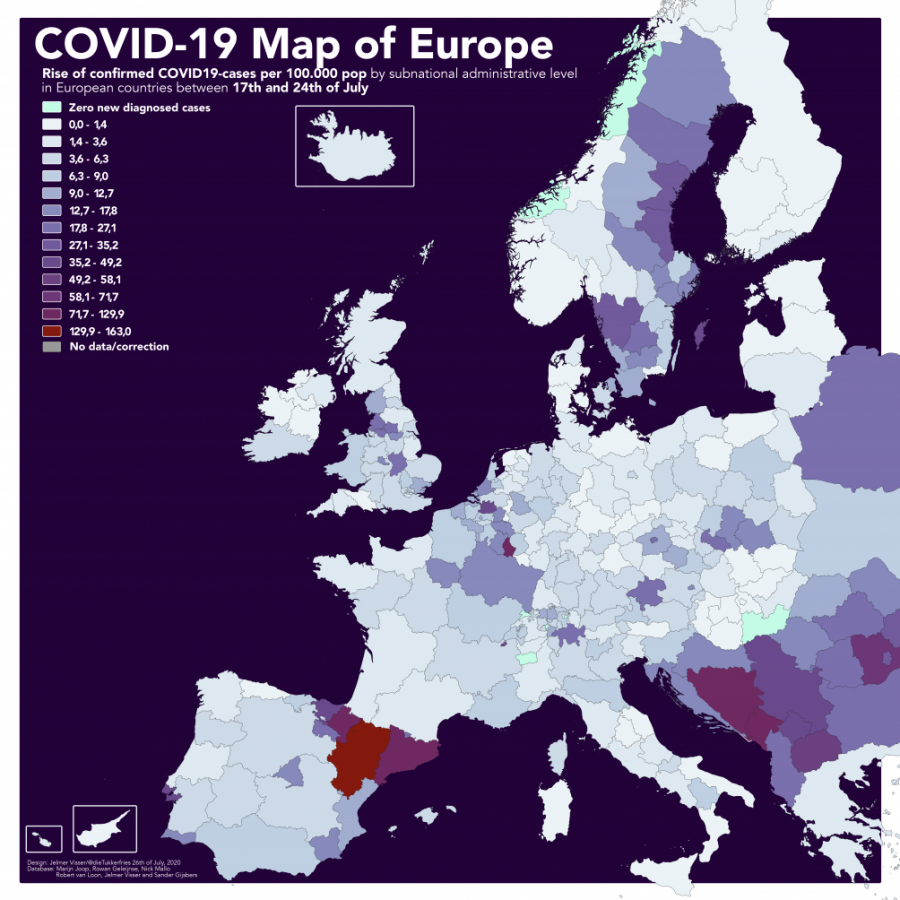Europe faces the second wave without lockdowns
Map illustrating the confirmed rise of COVID-19 case across Europe.
In the beginning of the pandemic, European nations were the first to be hit the hardest with COVID-19. This prompted quick responses to flatten the curve and prevent the healthcare systems from collapsing. Measures such as lockdowns, social distancing and mask mandates helped greatly to mitigate the threat and led to a fall in the number of confirmed cases and deaths. This led authorities to end lockdown and allow larger gatherings that adhered to social distancing guidelines.
However, this proved to be ill advised, as cases of COVID-19 positive patients increased drastically across Europe. Hospitals in Madrid now risk overfilling and a collapse of the healthcare system is a possibility. Additionally, across Europe, several countries have recorded the most daily new cases since the start of the pandemic.
According to John Hopkins University, France reported 12,120 new cases on Saturday and Spain reported 10,920 cases. Additionally, the Associated Press reports that the European Center for Disease Prevention and Control has found that there are over five counties in the region with more than 120 confirmed cases per 100,000 inhabitants in the last 14 days. These rising statistics signal towards the threat of a second wave.
Due to the rising case numbers, public health officials in Spain are considering stronger response to the surge in cases. Places of public gathering such as parks and shops are closed, and restaurants in Madrid have been limited to 50% capacity. The Associated Press reports that police in Madrid have restricted people in working class communities from going in and out of neighborhoods if the COVID infection rates are above 1,000 per 100,000 inhabitants. The current infection rate in Madrid is higher than any other European city.
Other nations in the region are also experiencing a rise in cases as the UK continues to record the highest daily number of infections day after day. On Friday, the UK recorded 6,873 daily new cases which is a much higher than daily infection cases in the spring. This high rate of infection has led to the prime minister, Boris Johnson, to reimplement the mask mandate along with other restrictions such as curfews on pubs and places of gathering.
The latest additions curfews have been hard to implement, as many citizens argue against the lockdown requirements, and urge the government not to implement them. The Guardian reports there are two sides to the arguments, with some proposing lockdowns as the only solution to reducing the number of increasing cases.
The other side argues against restrictions and lockdowns, stating that it would be damaging to the economy and the livelihood of people. However, the current government is aiming to take steps which would prevent a complete lockdown. Restrictions on gathering and enforcement of the mask mandate is one of the many steps being taken to prevent the conditions previously seen in Spring.
Other nations such as France, Croatia and Romania are also seeing a rise in COVID-19 cases. The rise in cases is associated with the lift of restrictions and people returning to workplaces and schools along with large gatherings. Countries such as France are, according to the Associated Press, opening more than 20 new testing centers.
Similar to the UK, restrictions are being put in place limiting the number of people allowed in gatherings and curfews on bars and restaurants. France 24 reports that the French President, Emmanuel Macron, has announced the closure of restaurants and bars in places with high COVID-19 cases, such as Marseilles.
The people in France are outraged, and according to an interview by France 24, the mayor of Marseilles has said “I am angry because there was no consultation,” and “Why turn the screws when our numbers have been improving for a few days now.” Other citizens have also voiced their anger with some business owners threatening to not follow any restrictions or orders from the government.
It remains to be seen how the pandemic will affect daily life in this second wave and the steps these countries take will be essential to slowing the spread.






